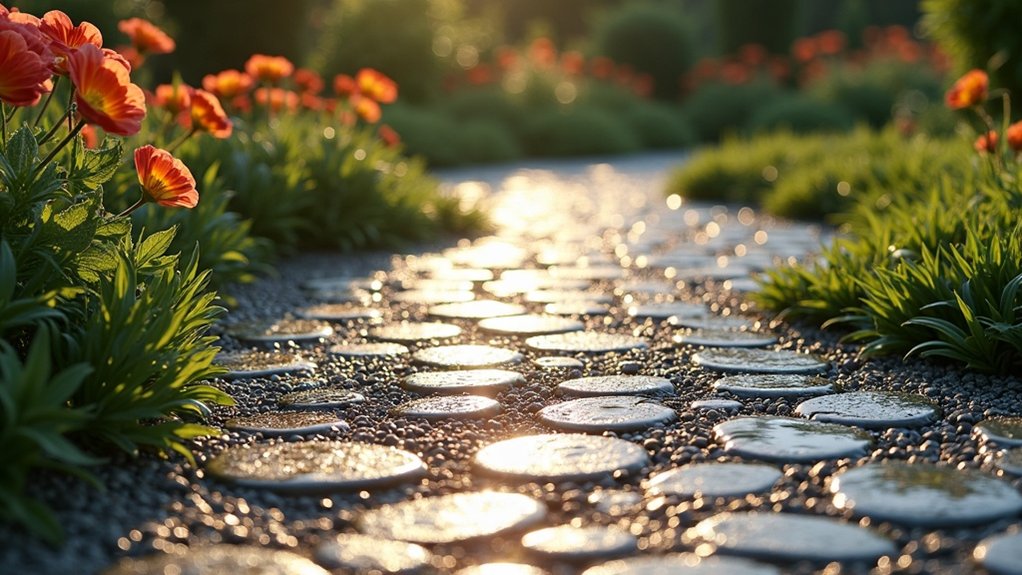Resin-bound gravel is brilliant at managing rainwater, with its super-porous structure allowing up to 95% of water to soak straight through. Think of it like a giant sponge for your driveway or path – water simply filters down rather than forming puddles or running off into the street. This clever system helps prevent localised flooding, particularly useful in British urban areas where we get plenty of rain. The gravel and resin mix naturally filters out pollutants as water passes through, improving the quality of groundwater whilst meeting UK drainage regulations. Built to withstand our weather, it’s a proper long-term solution for surface water management.
Key Takeaways
Resin-bound gravel works like a massive sieve for your driveway or patio – water simply seeps through rather than pooling on top. The mix of different-sized stones creates tiny spaces that let rainwater drain naturally, much like a garden bed.
The system ticks all the boxes for UK planning rules on permeable surfaces, which is particularly handy given our wet climate. Think of it as nature’s water filter: not only does it prevent puddles, but it also cleans the water as it passes through, helping top up groundwater supplies.
For best results, proper groundwork is essential. A well-installed resin-bound surface can handle everything from light drizzle to heavy downpours, significantly reducing the risk of localised flooding that often plagues traditional concrete or tarmac surfaces.
The Permeability and Drainage Mechanism of Resin-Bound Gravel
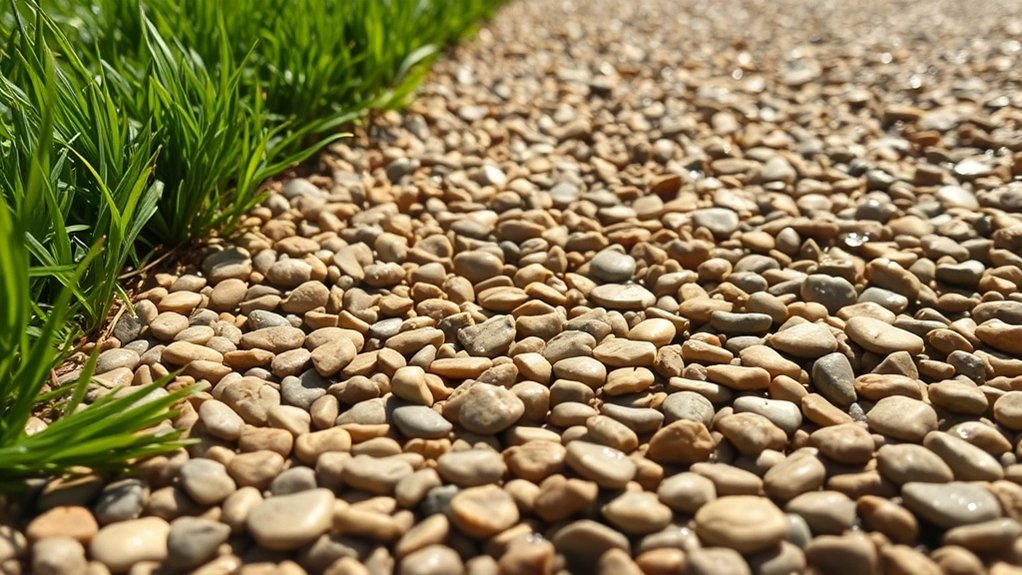
Understanding how resin-bound gravel handles water is key to its success as a durable surface. The resin coats each stone, creating a stable yet porous layer – much like a coffee filter letting water through whilst holding the grounds in place.
With up to 95% permeability, rainwater easily seeps through rather than forming puddles, making it ideal for British weather. The mix of different-sized stones, when properly bound, creates perfect gaps for water to flow through. Think of it as thousands of tiny channels working together, similar to how a sponge absorbs water. This technique supports Sustainable Urban Drainage Systems (SuDS), which play a vital role in effective urban water management.
The tough polyurethane resin keeps everything firmly in place whilst protecting against our varied weather conditions. Effective drainage is further enhanced by the natural filtering properties of resin-bound gravel, which also helps protect local waterways from pollutants.
Getting the installation and ground preparation spot-on is crucial. When done properly, resin-bound gravel helps manage rainwater naturally, taking pressure off local drainage systems – particularly useful during those heavy downpours we often see in the UK.
How Resin-Bound Gravel Reduces Surface Runoff
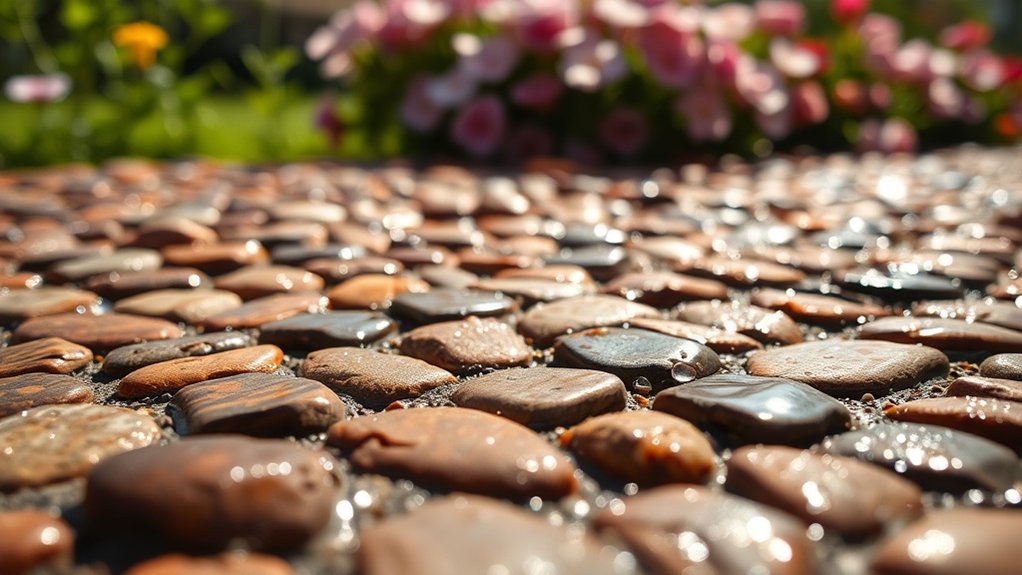
Resin-bound gravel surfaces effectively manage rainwater by allowing it to filter through rather than pool on top, much like a natural lawn would.
This clever system means less water running off into streets and drains, which helps prevent local flooding during those typical British downpours. The porous nature of the surface works brilliantly with our wet climate, meeting SUDS requirements whilst reducing the strain on local drainage systems. Additionally, this type of surface is compliant with UK regulations that mandate permeable materials for driveways over 5 square meters, ensuring homeowners can meet local planning requirements.
Think of it as a giant sponge for your driveway or garden path – the water seeps through naturally instead of creating puddles or streaming into road gullies. Not only does this help top up groundwater levels, but it also stops pollutants from washing into nearby streams and rivers. This permeability acts as a natural filter, significantly reducing pollution at the source and enhancing the water quality as it recharges local aquifers.
Regular sweeping and basic upkeep ensure the surface stays permeable year after year.
The system’s particularly useful in urban areas where concrete and tarmac typically cause drainage headaches during heavy rain. It’s a practical solution that works with nature rather than against it.
Structural Composition and Durability of Resin-Bound Systems
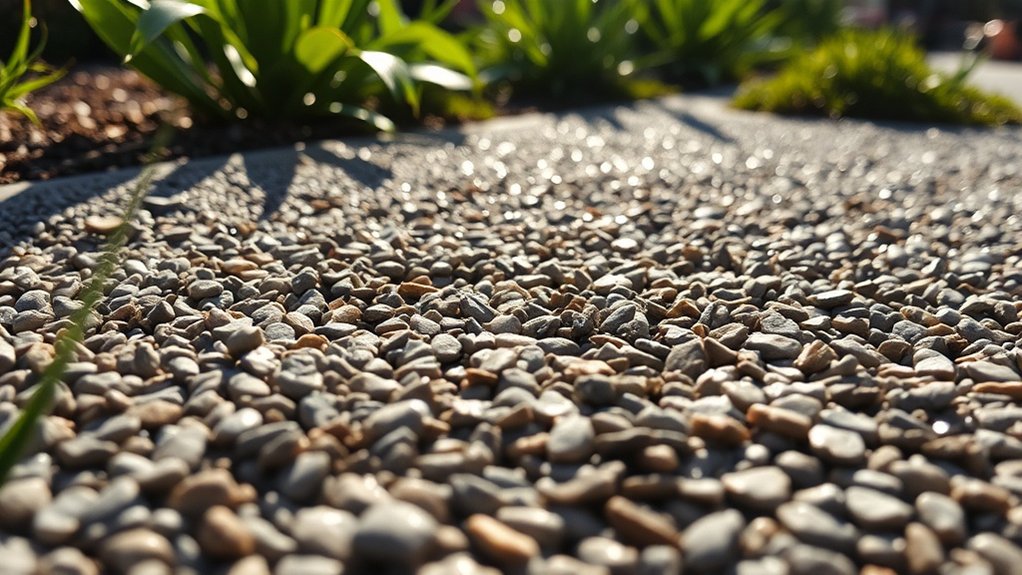
Resin-bound surfaces combine quality stone aggregates with clear, UV-resistant resin to create a tough, seamless finish. The resin’s chemical bonding firmly locks stones in place, much like super-strong glue holding a mosaic together. This creates a surface that stands up well to both chemical spills and physical wear – you won’t find loose stones or cracks appearing after a few months of use. The UV-stable composition means it won’t yellow or degrade in British weather, whether it’s facing harsh summer sun or winter frost. Think of it as a protective coat that shields the entire surface, working rather like a good wood varnish but much more durable. Additionally, the chemical bonds formed during the curing process enhance the overall durability of the surface. The robust structure means these surfaces need minimal upkeep and remain stable for years, making them a practical choice for driveways, paths and patios across the UK. They’re particularly suited to our climate, handling everything from heavy rain to occasional snow without deteriorating. Additionally, the permeability and environmental benefits of resin-bound systems help reduce surface flooding and groundwater runoff, making them an eco-friendly choice for urban areas.
Environmental Compliance and Regulatory Benefits
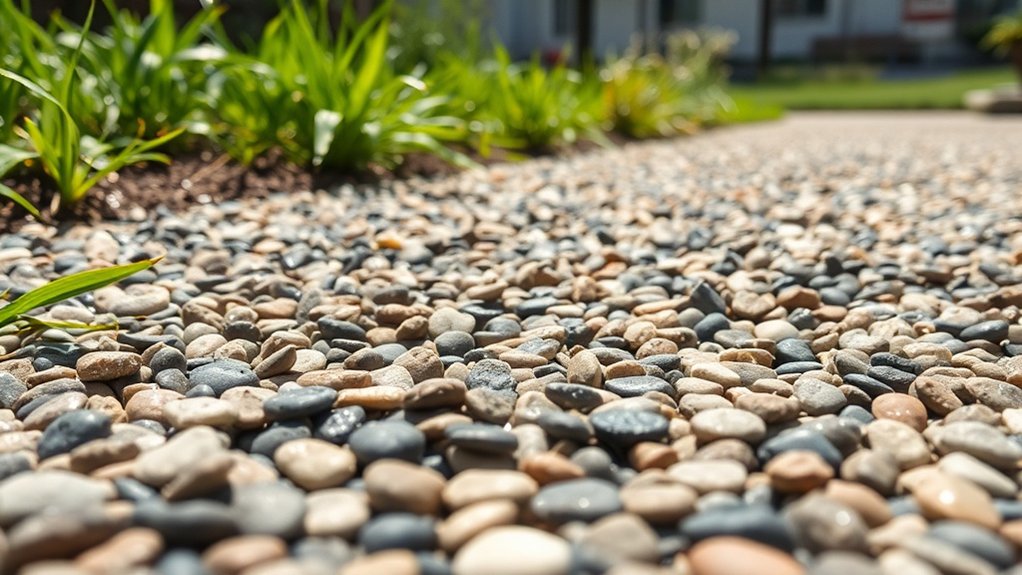
Resin-bound gravel surfaces meet strict UK environmental standards whilst offering practical drainage solutions.
These systems comply with Sustainable Urban Drainage Systems (SUDS) requirements, helping tackle common British weather challenges like flash floods and water logging.
The key environmental advantages include:
- Natural rainwater drainage into the ground
- Removal of pollutants as water filters through
- Better handling of heavy rainfall
- Full compliance with UK environmental laws
Backed by British Board of Agrément certification and FeRFA standards, resin-bound surfaces deliver both regulatory compliance and genuine environmental benefits.
For British property owners and developers, this means a future-proof solution that works with nature rather than against it.
Installation and Maintenance Advantages of Resin-Bound Gravel
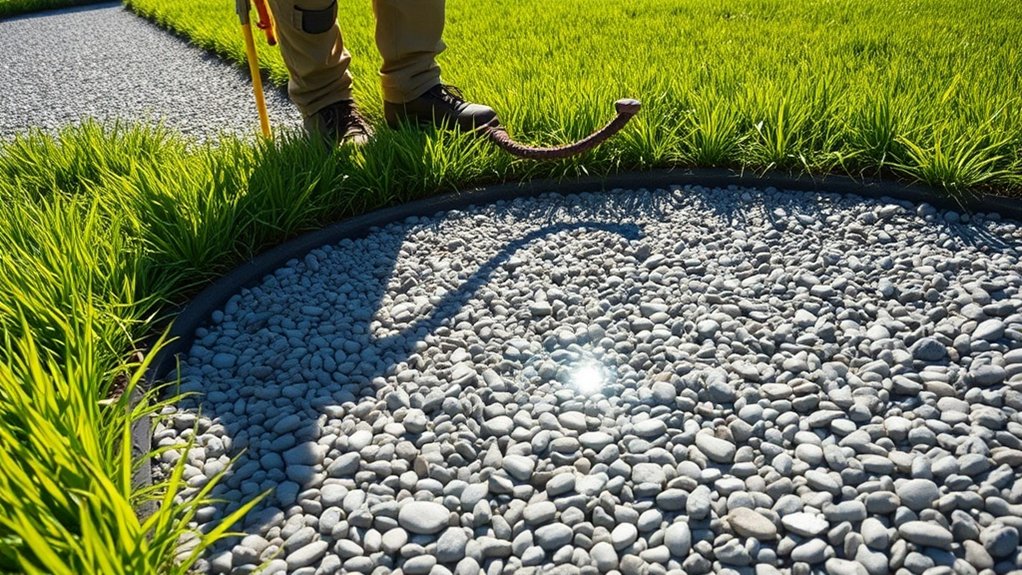
Resin-bound gravel stands out for its straightforward installation and hassle-free maintenance compared to traditional surfaces. The system fits perfectly around awkward corners and uneven areas – imagine working with a flexible material that moulds to your garden’s unique shape. It sets quickly too; you can typically walk on it within 24 hours.
Keeping it clean couldn’t be simpler. A quick brush to remove leaves and the occasional pressure wash is all it needs. Unlike loose gravel that scatters across your drive or traditional paving that attracts weeds, resin-bound surfaces stay put and weed-free.
You won’t need to mess about with yearly sealing or gritting in winter either. For busy homeowners, this practical combination of easy care and lasting quality makes it a sound investment.
Think of it as fitting and forgetting – no regular weekend maintenance needed.
Frequently Asked Questions
Can Resin-Bound Gravel Be Used in Colder Climates?
Resin-bound gravel works brilliantly in the UK’s cold weather, provided it’s properly installed and maintained. Much like our British driveways and paths, it needs proper drainage and a solid sub-base to handle frost and our typical winter weather. Think of it as wearing the right winter coat – with proper preparation, it’ll stand up to whatever the British weather throws at it.
How Long Does Resin-Bound Gravel Typically Last?
Resin-bound gravel surfaces typically last between 15 to 30 years when properly installed and maintained. Much like a well-built patio, these surfaces withstand daily foot traffic and British weather conditions whilst requiring minimal upkeep. Quality materials and professional installation are crucial for achieving maximum longevity.
Is Resin-Bound Gravel Eco-Friendly?
Resin-bound gravel offers several green credentials that make it an environmentally sound choice for UK homeowners. The system creates minimal waste during installation, uses less energy compared to traditional paving methods, and helps maintain natural drainage patterns. A key benefit for British gardens is that it allows rainwater to filter through naturally, reducing flood risks and supporting local wildlife habitats. The permeable surface works particularly well in our wet climate, whilst the long-lasting nature of the material means less frequent replacement and lower resource consumption over time.
Can I Install Resin-Bound Gravel Myself?
Most DIY-ers find resin-bound gravel installation challenging due to its technical demands. The job requires specialist tools and precise measurements. Whilst it’s possible to do it yourself, proper preparation and know-how are essential. Consider that even small mistakes can lead to costly repairs, particularly with British weather conditions affecting curing times.
What Colors and Designs Are Available for Resin-Bound Gravel?
Resin-bound gravel comes in more than 60 colours, perfect for creating bespoke patterns and designs. Blend different shades to complement your property’s style whilst ensuring a robust, practical surface. Popular combinations include warm browns for traditional homes and contemporary greys for modern properties.
Conclusion
The combination of resin and gravel creates a permeable surface that effectively tackles surface water runoff. Whilst costlier than standard paving or tarmac initially, resin-bound surfaces prove their worth through reduced flood risk and minimal upkeep needs. For British homeowners dealing with our notably wet climate, this surface offers a practical solution that protects driveways and gardens whilst supporting local drainage systems. The environmental benefits and lasting durability make it a sound investment for any UK property.
